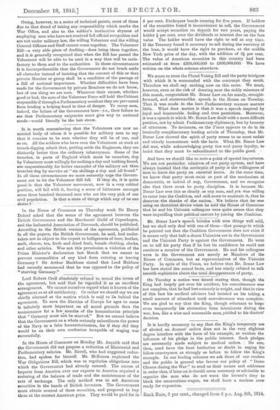Owing, however, to a series of technical points, most of
them due to that dread of taking any responsibility which marks the War Office, and also to the soldier's instinctive shyness of employing men who have not received full official recognition and aro not under military law, the willing Volunteer and the willing General Officers and Staff cannot come together. The Volunteer Bill—a very able piece of drafting—does bring them together, and it is generally recognized that when the Bill has passed the Volunteers will be able to be used in a way that will be satis- factory to them and to the authorities. In these circumstances It is incomprehensible that the Government do not brush aside all obstacles instead of insisting that the consent of this or that private Member or group shall be a condition of the passage of a Bill of national importance. Whether difficulties have been made for the Government by private Members we do not know, but of one thing we are sure. Whatever their excuse, whether good or bad, the men of the Volunteer Force will bold the.Cabinet responsible if through a Parliamentary accident they aro prevented from lending a helping hand in time of danger. To many mon, indeed, the failure of the Government here-4.e., their failure to see that Parliamentary exigencies must give way to national needs—would literally be the last straw.










































 Previous page
Previous page